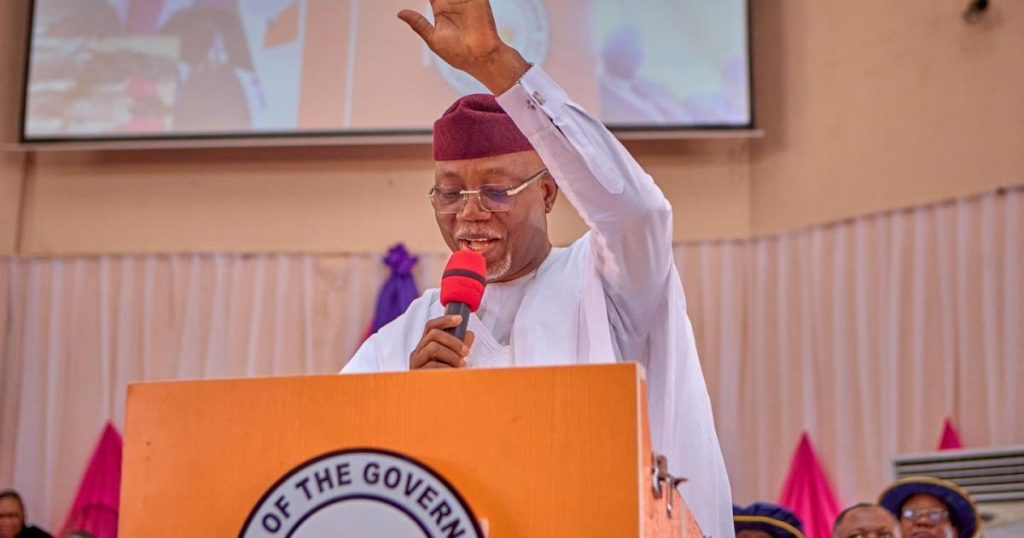The Ondo State Governorship Election Dispute: A Deep Dive into the Legal Battle and Its Implications
The November 16, 2024, governorship election in Ondo State, Nigeria, culminated in a victory for Governor Lucky Aiyedatiwa and his deputy, Dr. Olayide Adelami, both representing the All Progressives Congress (APC). However, this victory was not without its legal challenges. Olugbenga Edema, the New Nigeria Peoples Party (NNPP) candidate, contested the outcome, initiating a legal battle that traversed two levels of the Nigerian judiciary. This extended legal wrangling underscored critical questions about the electoral process, the interpretation of constitutional provisions, and the role of the courts in adjudicating electoral disputes. Edema’s persistent challenges, though ultimately unsuccessful, highlighted the complexities and nuances of electoral law in Nigeria.
Edema’s initial challenge was lodged at the Federal High Court. His primary argument centered on Section 15 of the Third Schedule to the 1999 Constitution (as amended). This section deals with the qualifications and disqualifications for election to the office of Governor. Edema sought an order compelling the Independent National Electoral Commission (INEC) to remove Aiyedatiwa and Adelami from the list of candidates for the election. The specifics of Edema’s argument regarding Section 15 were not explicitly detailed in the provided text, but it can be inferred that he alleged some violation of this section by the APC candidates. However, the Federal High Court dismissed Edema’s case, a decision that prompted him to escalate the matter to the Court of Appeal.
Undeterred by the Federal High Court’s decision, Edema appealed the verdict, hoping for a reversal of the lower court’s ruling. His appeal reiterated his arguments regarding the interpretation of Section 15 and its alleged violation by Aiyedatiwa and Adelami. Edema contended that the Federal High Court had erred in its judgment and sought to have the Court of Appeal overturn the decision. His persistence demonstrated a commitment to exploring all legal avenues available to challenge the election results. However, the appellate court would ultimately affirm the lower court’s judgment, dealing a final blow to Edema’s legal challenges.
The Court of Appeal, sitting in Akure, the Ondo State capital, meticulously reviewed the case presented by Edema. In a unanimous decision delivered by Justice Oyebisi Omoleye, the three-man panel affirmed the judgment of the Federal High Court, dismissing Edema’s appeal on two grounds: abuse of court process and lack of merit. The court deemed the appeal an abuse of process, likely indicating that Edema’s arguments were considered frivolous, repetitive, or designed to unnecessarily prolong the legal proceedings. Additionally, the court found the appeal to lack merit, implying that Edema’s legal arguments were weak and unsubstantiated. The court further imposed a fine of N1 million against Edema in favor of each respondent, a decision that underscored the court’s view of the appeal’s frivolous nature.
The reaction to the Court of Appeal’s judgment was swift and decisive. Dr. Kayode Ajulo, SAN, the Ondo State Attorney General and Commissioner for Justice, lauded the court’s decision. He emphasized the thoroughness of the judges’ analysis and research, highlighting the judgment as a reaffirmation of the people’s mandate expressed in the 18-0 victory secured by Aiyedatiwa. This unanimous victory across all 18 local government areas of the state signified a strong endorsement of the APC candidates. Ajulo’s comments underscored the importance of respecting the outcome of the democratic process and moving forward for the betterment of Ondo State.
Ajulo’s statement further emphasized the need for unity and collaboration in Ondo State. He called for an end to the litigation, stressing that both the appellant and the respondents are citizens of the same state and should prioritize collective progress over protracted legal battles. His call for unity underscored the potential for such disputes to be divisive and disruptive. He urged all parties to accept the outcome of the legal process and work together for the development of the state. This plea reflected a broader concern about the potential negative impacts prolonged legal challenges could have on the state’s political and social fabric. Ajulo’s perspective highlighted the importance of moving beyond electoral disputes and focusing on governance and development.














